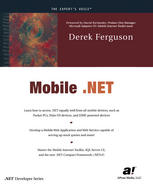

Most ebook files are in PDF format, so you can easily read them using various software such as Foxit Reader or directly on the Google Chrome browser.
Some ebook files are released by publishers in other formats such as .awz, .mobi, .epub, .fb2, etc. You may need to install specific software to read these formats on mobile/PC, such as Calibre.
Please read the tutorial at this link: https://ebookbell.com/faq
We offer FREE conversion to the popular formats you request; however, this may take some time. Therefore, right after payment, please email us, and we will try to provide the service as quickly as possible.
For some exceptional file formats or broken links (if any), please refrain from opening any disputes. Instead, email us first, and we will try to assist within a maximum of 6 hours.
EbookBell Team

4.4
92 reviewsMobile .NET begins by examining a wide variety of different wireless Internet devices. These devices are divided into two main divisions: those that are directly supported by .NET (Pocket PCs, i-Mode phones, and WAP devices) and those that are not (Palm OS and J2ME-powered devices). By the end of this book, you'll be able to make .NET work equally well with all of the devices.
In the middle section of the book, the advantages of .NET as a development platform are first introduced. You'll produce a .NET web application capable of serving up stock quotes to virtually any wireless device as an exercise, building on it chapter by chapter. The section concludes with a demonstration of how you can invoke .NET Web services, the cornerstone of Microsoft's new "programmable Internet," from each of the wireless devices mentioned previously.
Mobile .NET concludes by drilling deep down into the technologies provided by .NET specifically for use with wireless devices. The Mobile Internet Toolkit, which can automatically adapt the output of a .NET web application based upon the special needs of differing client devices, is discussed first. Next, Microsoft's mobile data strategy and the main technologies underlying it, SQL Server (CE and desktop versions), XML, and ADO.NET, are discussed. Finally, in a special technology sneak preview, author Derek Ferguson unveils Microsoft's mobile .NET technology, which brings the power of .NET development directly to handheld devices: the .NET Compact Framework.